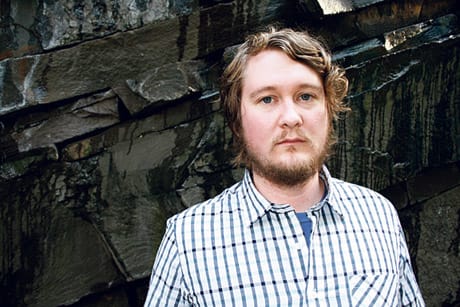Just a few months ago, Mark Templeton released the wonderful Acre Loss, a collaboration with video artist (and fellow Albertan) AA Munson that brought together sounds of the quotidian, nature and music into aural landscapes. On Inland, Templeton sticks mostly to the indoors and guitars, with occasional percussion, to create an equally expansive but more immediately musical work. Tracks develop from simple figures or drones, which are digitally manipulated, or melodic fragments that are recombined to form dreamlike approximations of songs. Album opener "At Your Feet" introduces both schemas quite nicely. "Oak" has bowed strings, masses of digital blips, like popping soap bubbles, and Templeton's wordless vocals haunting the tree branches. His layered voice is key to the development of "Sleep in Front Of," a track also notable for longish sections of untreated guitar and drums rather than the synaptic buzz of micro-edits Templeton tends to favour. Those jump-cuts dominate tracks like "Seam," sizzling like an electric net set atop a swampy pond. Unlike pop, which has the power to recall distinct times and places, this music, with its omissions and overstrikes of melody, effectively creates new connections across time and place, and gets at the deeper meanings between them.
There appears to be some tension between description and abstraction in your music.
That is exactly what I am trying to accomplish: the balance between description and abstraction. If there is strong emotion throughout my music, images will come about naturally. I do not produce my works based on an image that I have seen or imagined. These images reveal themselves as the music triggers different emotions or memories.
Is the rigorous editing your favourite part of making an album?
It can be but at times, it tends to be a tedious exercise that is more exhausting than playing the guitar. Nonetheless, while editing I feel as though I stumble upon new ideas, ideas that otherwise would not have been discovered if I had not meticulously arranged the pieces.
Has the move to Montreal had any impact on your creative process?
Yes, most definitely. In the past, much of my inspiration came from a sense of isolation, as I was living in Northern Canada. Driving through the prairies, seeing open fields while travelling from one isolated town to another. While living in Montreal, the things that I am influenced by are more the people and the architecture - a different kind of landscape.
(Anticipate)There appears to be some tension between description and abstraction in your music.
That is exactly what I am trying to accomplish: the balance between description and abstraction. If there is strong emotion throughout my music, images will come about naturally. I do not produce my works based on an image that I have seen or imagined. These images reveal themselves as the music triggers different emotions or memories.
Is the rigorous editing your favourite part of making an album?
It can be but at times, it tends to be a tedious exercise that is more exhausting than playing the guitar. Nonetheless, while editing I feel as though I stumble upon new ideas, ideas that otherwise would not have been discovered if I had not meticulously arranged the pieces.
Has the move to Montreal had any impact on your creative process?
Yes, most definitely. In the past, much of my inspiration came from a sense of isolation, as I was living in Northern Canada. Driving through the prairies, seeing open fields while travelling from one isolated town to another. While living in Montreal, the things that I am influenced by are more the people and the architecture - a different kind of landscape.
